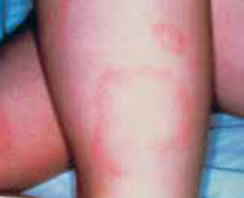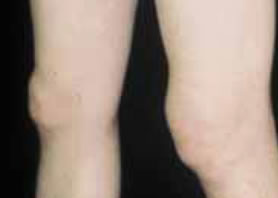Launching 1st March 2023. Also check out: https://www.thailandmedical.news/
Usually, the first symptom of Lyme disease is a red rash known as erythema migrans (EM). The telltale rash starts as a small red spot at the site of the tick bite. The spot expands over a period of days or weeks, forming a circular or oval-shaped rash. Sometimes the rash resembles a bull's eye, appearing as a red ring surrounding a clear area with a red center. The rash, which can range in size from that of a dime to the width of your back, appears within a few weeks of a tick bite and usually at the site of the bite. As infection spreads, rashes can appear at different sites on the body.
 |
| Erythema migrans rash on an arm |
Erythema migrans is often accompanied by symptoms such as fever, headache, stiff neck, body aches, and fatigue. Although these flu-like symptoms may resemble those of common viral infections, Lyme disease symptoms tend to persist or may come and go.
After several months of B. burgdorferi infection, slightly more than half of people not treated with antibiotics develop recurrent attacks of painful and swollen joints that last a few days to a few months. The arthritis can shift from one joint to another. The knee is most commonly affected.
 |
| Swollen knees due to Lyme arthritis. Courtesy of Dr. Alan Steere, Massachusetts General Hospital, Boston. |
About 10 to 20 percent of untreated people will go on to develop chronic (long-lasting) arthritis.
Lyme disease also can affect your nervous system, causing symptoms such as;
More subtle changes such as memory loss, difficulty concentrating, and a change in mood or sleep habits also have been associated with Lyme disease.
Nervous system problems usually develop several weeks, months, or even years following an untreated infection. These symptoms often last for weeks or months and may return.
Less commonly, untreated people may develop other problems weeks, months, or even years after infection.
Fewer than 1 out of 10 people with Lyme disease develop heart problems, such as irregular heartbeat, which can start with dizziness or shortness of breath. These symptoms rarely last more than a few days or weeks. Such heart problems generally show up several weeks after infection.
Less commonly, Lyme disease can result in eye inflammation, hepatitis (liver disease), and severe fatigue, although none of these problems is likely to appear without other Lyme disease symptoms being present.